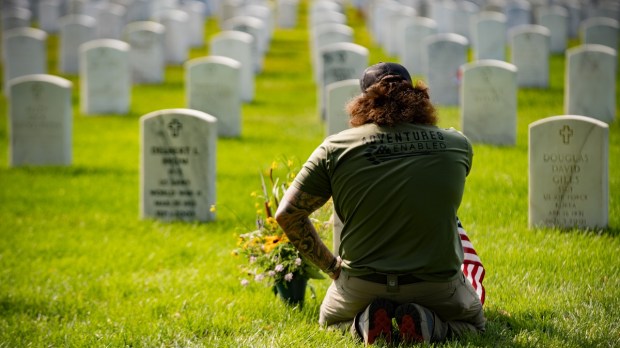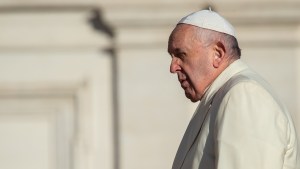Lenten Campaign 2025
This content is free of charge, as are all our articles.
Support us with a donation that is tax-deductible and enable us to continue to reach millions of readers.
America, as a nation, has been marked in profound ways by both wars and films. It’s renowned worldwide for both the military might of the Pentagon and the cultural might of Hollywood. But what happens when the two intersect, its cameras and rifles suddenly pointing at each other?
Predictably, war films tend to fall into one of two camps: movies that glorify or at least defend war, and movies that criticize and even condemn it. One thinks, in the first case, of Saving Private Ryan, which — though certainly not shying away from the horrors of war, particularly in its harrowing opening sequence — is nevertheless a great ode to the valor of the soldiers fighting World War II. And one thinks, in the second case, of The Thin Red Line, which — though released in the same year and focusing on the same conflict — takes a far more critical attitude toward war and its costs.
Documentaries can cut through and transcend this bifurcation simply by capturing the reality of war — both the valor and the horror, both the noble aims and the ultimate price. This is the space inhabited by Make Peace or Die: Honor the Fallen, a new film about grieving military families by filmmaker Manny Marquez, premiering this Veterans Day on PBS’ Independent Lens.
Marquez’s résumé includes Psychopath, about his uncle Victor’s horror theme park, the in-development After the Apocalypse about the filming of Apocalypse Now (one of Marquez’s favorites) in the Philippines, and the Wonder series for Word on Fire narrated by The Chosen’s Jonathan Roumie.
In Make Peace or Die, all three of these passions — his Oklahoma roots, the art of the war movie, and a deep Catholic faith — converge on a deeply personal and deeply human film, one that is, in the filmmaker’s own words, neither pro-war or anti-war, but rather “pro-empathy and pro-healing.”
His brother, the Marine
Make Peace or Die follows the journey of Marquez’s younger brother Anthony, who served as a Marine from 2007 to 2012. In 2011, Anthony deployed to Sangin, Afghanistan, where he served as a dog handler with the 1st Battalion, 5th Marines. (The film’s title comes from the unit’s motto, which is inscribed on their insignia.)
We see Anthony go from a young kid driving a jeep through rural Oklahoma talking about maybe going to war (“If that’s where I go,” he says, “then that’s where I go”) to a heavy-laden Marine enduring the loss of no fewer than 17 men in his unit in five months — not to mention his own close call with death.

Now, he is a combat veteran living back home — faced, like so many other veterans, with reintegrating into civilian life without succumbing to the invisible wounds of trauma. Anthony speaks candidly about struggling to find physical and mental stability. Twice, he admits, he put a gun in his mouth.
But he also recalls becoming troubled by his own inaction: What was he doing to help the “Gold Star families” — families of fallen service members — from his unit? “Make peace or die” was still a fitting motto, but now with an entirely different meaning: If the survivors and Gold Star families didn’t find peace, they very well might die — of guilt, grief, or both.
Another mission
Anthony’s first mission, which lasted about three years, consisted of hand-carving a “battlefield cross” (a vertical arrangement of helmet, rifle, and boots) with a chainsaw, and delivering one to each of the families — a period captured by Marquez in the documentary short XVII Carvings.
But as the 10-year anniversary of the deployment approached, the brothers decided to set out on the road coast to coast across America.

Anthony’s new mission? To make the names of the fallen 17 known; to give a voice to the Gold Star Families by allowing them to tell their Marines’ stories; and to cultivate healing —both in the families’ lives and in his own. As a kind of symbol of this new quest, he sets out to gather a piece from each family’s dress blues, delivering the assembled uniform to the National Museum of the Marine Corps in the film’s denouement.
Journeying with Anthony into the homes of these grieving families gives us a unique vantage point on both the heroism and high cost of war. War movies often capture the moment such families’ lives change forever: the military vehicle slowly pulling up, the mother or wife immediately knowing what it means, the horrified screams and silent sobs. But what happens then? What happens, as one mother recalls, when people in the community eventually stop showing up and move on?
Make Peace or Die honors those who will always remember — many of the families have entire walls, even rooms, dedicated to their sons and their memory — and it invites the rest of us to never forget. It is a solemn act of remembrance.
For these family members who remember the loss most vividly, and feel the pain most acutely, a question also presents itself most forcefully: Was it all worth it?
In one scene, the father of LCpl. Sean O’Connor speaks from the heart, questioning whether America’s lingering presence in Afghanistan beyond its more targeted and limited goals was simply “a huge waste” of life: “What did we accomplish in the end?”
Rather than make a political statement about the war on terror — such scenes, the director notes, have irked people on both the right and the left, for different reasons — Make Peace or Die remains focused on the preciousness of human life and the pain of its loss.
One casualty officer — a man embarking on his own project of healing with a “barn” honoring the fallen — says later in the film, “It seems so insignificant in a world so big, but it means the most to that one person, who lost that little bit of the world.”
Small, intimate, concrete realities of human communion — like a photograph of one Marine, faded and wrinkled from years of carrying — are impressed with a sacred significance.

Indeed, the Christian faith — from the opening shot of crosses to the smaller cross leading the RV across the country — is what gives meaning and purpose to this journey. In Utah, the family of LCpl. Norberto Mendez-Hernandez recalls receiving their son’s rosary and Bible after his passing, calling to mind his favorite passage — Psalm 91.
In Washington, the father of Sgt. Adan Gonzales Jr. reads an emotional letter their fallen Marine wrote to his grandmother: “I know God hears your prayers, and I will continue to seek him as well. I do believe God is with me on these long patrols … My life is in his hands. And I trust in him. I know he is with me now and will be waiting for me hereafter.”
Church tradition
The Catholic Church has a long tradition, stretching back to Augustine, of the “just war” — a “legitimate defense by military force” under certain conditions (CCC 2309). At the same time — especially with the development and proliferation of weapons of mass destruction — the Church has raised its prophetic voice against the horror and devastation of war, which is so often launched under unjust conditions.

“Never again war!” cried Pope St. Paul VI in 1965. “It is peace, peace, that has to guide the destiny of the nations of all mankind!” His successors have followed in his footsteps, including Pope Francis, who has repeatedly decried the “madness” of war. God is a God not of war, but of peace: “For the peace of Jerusalem pray: ‘Peace be to your homes! May peace reign in your walls, in your palaces, peace!” (Ps. 122:6–7).
Until the dream of peace is realized, war remains a lived reality for so many. Make Peace or Die is a welcome reminder that love is stronger than death, and the peace of God — a peace of healing that “surpasses all understanding” (Phil. 4:7) — stronger than the violence of man.
~
Matthew Becklo is a husband and father, writer and editor, and the Publishing Director for Word on Fire Catholic Ministries. His first book, The Way of Heaven and Earth: From Either/Or to the Catholic Both/And, releases in 2025.




